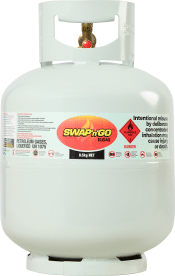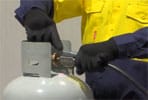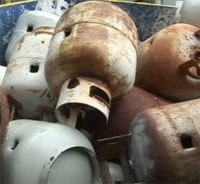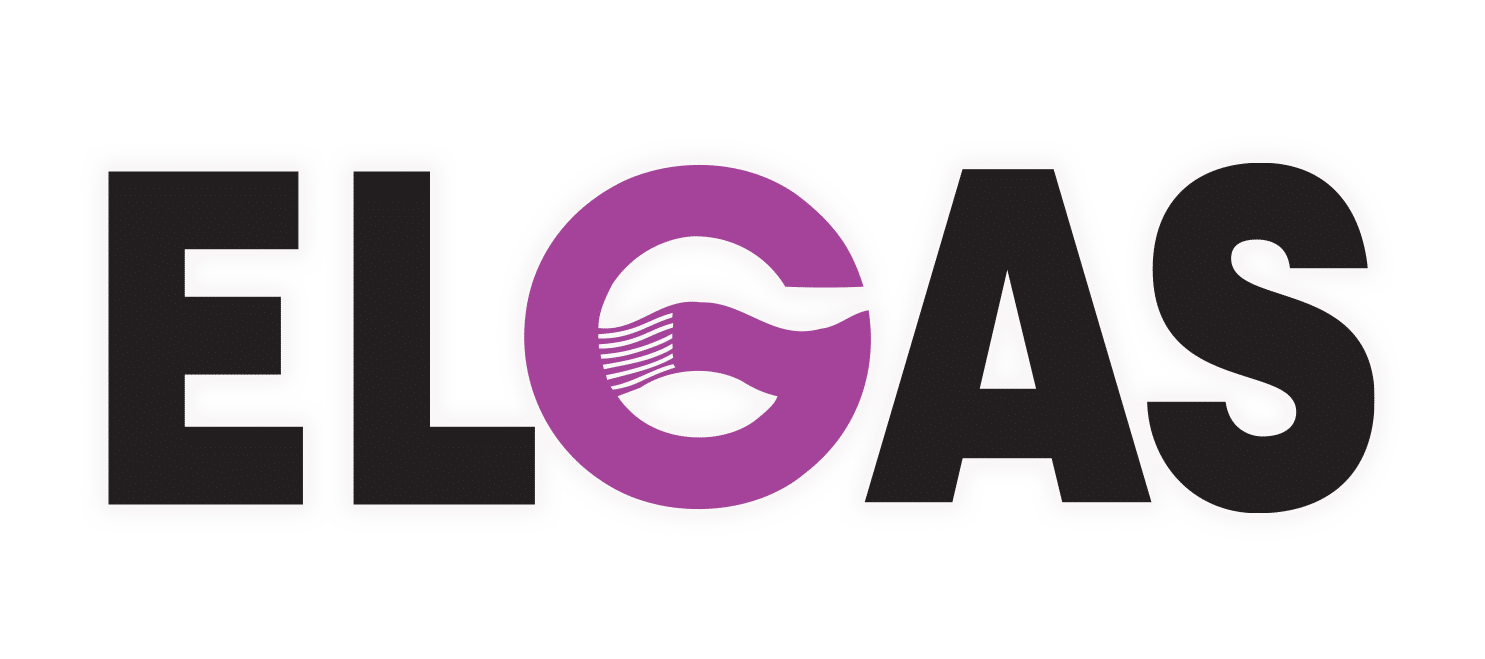9kg Gas Bottle Testing – 9kg Gas Bottle Expiry Date – LPG Tank Testing
 The 9kg gas bottle expiry date and 9kg gas bottle testing is important for gas BBQ safety.
The 9kg gas bottle expiry date and 9kg gas bottle testing is important for gas BBQ safety.
Required 9kg gas bottle testing (LPG gas tank testing) is an integral part of BBQ gas bottle safety.
At ELGAS, all our gas bottles are subject to gas bottle testing (LPG tank testing) to meet the strict Australian standards for safety.
Our gas bottle testing (LPG tank testing) station technicians check gas bottle level of compliance, ensure gas bottle testing (LPG tank testing) and maintenance that meets the highest standards, so you can use your LPG in confidence for BBQs, home and commercial applications.
Australian Standards for Home and Commercial Gas Cylinders
There are no set Australian standards for gas bottle manufacturing and there are many manufacturers.
However, gas bottles need to be maintained in perfect working order according to Australian gas bottle testing standards.
With the SWAP’n’GO® network of close to 6,000 dealers in all Australian states, home gas bottle delivery, and refilling operations, we take 4kg and 9kg gas bottle testing and safety seriously.
Gas bottles are marked with a 4kg or 9kg gas bottle expiry date stamp so you know when the next gas bottle testing (LPG tank testing) date is due.
If your gas bottle is undamaged it can be refilled any number of times prior to the 4kg or 9kg gas bottle expiry date.
Gas Bottle Testing – LPG Gas Tank Testing – 4kg and 9kg Gas Bottle Expiry Date
Gas bottle testing (LPG tank testing) is necessary because it is dangerous and also illegal to fill past the 4kg and 9kg gas bottle expiry date or to fill damaged cylinders without new gas bottle testing (LPG tank testing).
The cylinders require LPG gas tank testing (gas bottle testing) and re-stamping at an approved gas bottle testing station.
If installing LPG at your home or business, the installation must be performed by a qualified gas fitter.
You will also need to store the gas bottles in a safe location.
A complete periodic LPG gas tank testing (gas bottle testing) of an LPG cylinder every 10 or 15 years can include:
- gas bottle expiry date confirmation
- degassing prior to gas bottle testing (LPG tank testing)
- internal inspection to check gas bottle level of corrosion
- external inspection to check gas bottle level of corrosion
- valve inspection or replacement
- new 4kg or 9kg gas bottle expiry date stamp after gas bottle testing (LPG tank testing)
Please see: Gas Bottle Testing (LPG tank testing) Facts
Where is the Expiry Date on a Gas Bottle
 The expiry date on a gas bottle is stamped into the metal on the gas bottle neck. See image.
The expiry date on a gas bottle is stamped into the metal on the gas bottle neck. See image.
In Australia, a BBQ size gas bottle is good for ten years after the gas bottle testing date.
External Gas Bottle Testing – LPG Tank Testing – Check Gas Bottle Level of Defects
 The external surface of the gas bottle is inspected for defects, as defined by the applicable LPG gas bottle testing Standard, AS 2337.1-2004.
The external surface of the gas bottle is inspected for defects, as defined by the applicable LPG gas bottle testing Standard, AS 2337.1-2004.
Failure in any one category of the gas bottle testing (LPG tank testing) is cause for condemning the gas bottle.
LPG Gas Bottle Testing Preparation by De-gassing
At the start of the LPG gas bottle testing (LPG tank testing) process, the gas bottle is totally emptied of any remnant gas.
The old gas valve is then removed to facilitate the internal gas bottle testing (LPG tank testing).
Internal Gas Bottle Testing & Check Gas Bottle Level of Corrosion
LPG gas bottle testing (LPG tank testing) includes an internal inspection to check gas bottle level of corrosion.
Any gas bottle that fails to meet the gas bottle testing (LPG tank testing) Standard is condemned.
Cylinder Neck
The neck of the gas bottle is a critical area of gas bottle testing (LPG tank testing), as it is the point of attachment for the valve.
Once again, failure in any area of LPG gas bottle testing (LPG tank testing) is cause for condemnation.
New 4kg or 9kg Gas Bottle Expiry Date
 Gas bottles that pass all of the LPG gas bottle testing are stamped with a new 4kg or 9kg gas bottle expiry date, showing the month and last two digits of the year.
Gas bottles that pass all of the LPG gas bottle testing are stamped with a new 4kg or 9kg gas bottle expiry date, showing the month and last two digits of the year.
Valve Installation After Successful LPG Gas Bottle Testing Procedure
After successful LPG gas bottle testing (LPG tank testing) procedure, the next step is the installation of a new valve, as shown in the picture.
The old valves are discarded and recycled.
LPG Gas Tank Testing for Vehicles
 LPG gas tank testing (LPG tank testing) in vehicles must also be inspected every ten years.
LPG gas tank testing (LPG tank testing) in vehicles must also be inspected every ten years.
The Autogas LPG gas tank testing (LPG tank testing) includes structural integrity, internal and external inspections to check gas bottle level of corrosion, and pressure relief valve functionality.
The LPG gas tank testing (LPG tank testing) expiry date is the same story as for other gas bottle expiry date, and checks are mandatory.
As with other gas cylinders, it is illegal to refill an out-of-date gas expiry.
Gas Bottle Disposal of Expired and Damaged Gas Cylinders
Even the toughest steel has its days, and SWAP’n’GO bottles and other large cylinders that fail gas bottle testing (LPG tank testing) are condemned.
 Expired and faulty gas bottles are safely retired by punching a large hole in the side so metal recycling workers know the cylinder has been safely decommissioned.
Expired and faulty gas bottles are safely retired by punching a large hole in the side so metal recycling workers know the cylinder has been safely decommissioned.
In addition to recycling the steel from the gas bottles, the brass from the valves is also recycled.
Everything is taken care of by ELGAS experts who are experienced in retesting out-of-date cylinders, detecting gas leaks and other gas bottle testing services.
Your old gas bottle can be exchanged for one in as-new condition for no extra charge at ELGAS and SWAP’n’GO.
Please see: Gas Bottle Disposal & Where to Dispose of Gas Bottles Near Me – Gas Bottle Recycling
How to Check Gas Bottle Level – How to Check Level of Gas Bottle
There are some gas bottle testing procedures you can perform yourself, including gas bottle testing for how to check gas bottle level (how to check level of gas bottle).
The easy steps to follow to check gas bottle level are:
- Pour warm water (not boiling water) down the side of the bottle.
- Wait a minute.
- Run your hand down the side of the bottle.
- It will feel cool to the touch at the level of LPG and you may notice a condensation line.
- You’ve just done a check gas bottle level so now know how much gas is left in your bottle.
- Does your bottle need a refill? Contact ELGAS or visit your nearest SWAP’n’GO retailer
Please see: How to Check Gas Bottle Level – Check Level of Gas Bottle
Gas Bottle Testing and Refilling Your LPG Gas Cylinders
LPG is used for numerous applications that include cooking, heating, and hot water, so it is an important safety consideration to ensure your cylinder is in top working order.
In general, your gas cylinders can be automatically replaced with new ones.
That’s the beauty of being an Elgas customer or a SWAP’n’GO customer.
Make sure to check your gas bottle expiry date stamp periodically to ensure it hasn’t expired.
 Refilling – While not part of the formal gas bottle testing (LPG tank testing) process, the new valve installation should always be leak tested when refilled.
Refilling – While not part of the formal gas bottle testing (LPG tank testing) process, the new valve installation should always be leak tested when refilled.
In fact, this is the standard procedure for all subsequent refilling, as well.
Refurbishment – In addition to the normal gas bottle test procedures, over half of the bottles tested by SWAP’n’GO are also cleaned and repainted.
The end result is a refurbished gas bottle in as new condition with a new 4kg or 9kg gas bottle expiry date stamp that’s valid for ten years.
 Recycling – SWAP’n’GO bottles that are condemned are safely decommissioned.
Recycling – SWAP’n’GO bottles that are condemned are safely decommissioned.
In addition to recycling the steel from the gas bottles, the brass from the valves is also recycled.
Gas Bottle Testing with a Licensed Gas Bottle Testing Service
LPG is a volatile gas with tremendous power when under pressure, so it makes sense to trust the experts at ELGAS.
After the gas bottle expiry date, LPG gas tank testing (LPG tank testing) must be performed.
The ELGAS gas bottle testing (LPG tank testing) station technician will stamp a new gas bottle expiry date into the neck ring if the LPG gas cylinder is in top working order.
Here is a breakdown of some LPG gas tank testing (LPG tank testing) procedures involved:
- A determination that the gas bottle expiry date has been reached.
- External gas bottle testing (LPG tank testing) is performed.
- The LPG Cylinder is degassed to allow for internal gas bottle testing (LPG tank testing) and to check gas bottle level of corrosion.
- The old valve is removed and an internal gas bottle testing inspection is done to check gas bottle level of contamination.
- The cylinder neck and valve threads are inspected for any damage.
- A new gas bottle expiry date is stamped into the cylinder neck ring.
- A new valve is installed after the successful completion of LPG gas tank testing (LPG tank testing).
- Any required refurbishment, including painting, is performed.
- The cylinder is ready for refilling and return to use.
- Any cylinders that fail the gas bottle testing (LPG tank testing), at any point are condemned and recycled.
New Residential LPG customer?
New Business LPG customer?
Existing ELGAS customer?
- BBQ – Gas and Charcoal BBQ Features – Charcoal BBQ vs Gas BBQ Comparison - March 31, 2025
- GPL Gas (GPL Fuel) – GLP Gas – LPG Gasul: GLP-GPL Gas Station - March 26, 2025
- Think LPG When Building a New Home - February 26, 2025
Steve Reynolds
Technical Consultant
Steve Reynolds is a leading expert in the LPG industry with over 22 years of experience. As part of the national management team at ELGAS, Steve ensures the safe and efficient storage, handling, and transportation of LPG. He serves as the lead investigator for incidents and collaborates with authorities on industry developments.
Steve is a technical advisor to Standards Australia and Gas Energy Australia (GEA), and an active member of the World LPG Association (WLPGA), contributing to global standards and technical reviews. He holds a BSc. (Hons) in Industrial Chemistry from UNSW and has held senior safety and technical roles at ELGAS, making him a trusted authority in LPG safety and standards.



